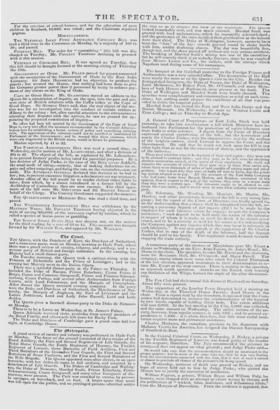A General Court of Proprietors of East India Stock was
held yesterday, to take into consideration a bill which Ministers have in- troduced into Parliament for the protection of native labourers sent from India to other colonies. A report from the Court of Directors expressed general approbation of the bill ; but the limaevolent and manly Sir Charles Foibes, with his characteristic zeal for the welfare of the helpless natives, stood forward to oppose the Court and the Government. lie said that lie could not look upon the bill in any other light than as one for the extension of slavery, and the oppression of the natives— These poor wretches were to be deprived of their civil lights ; they were not to be allowed to contract debts ; and they were to be left, even for obtaining absolute necessaries, entirely at the mercy of their employers. He could not conceive the necessity of inducing tIwte poor men to leave their native soil, where there were thousands of miles of land capable of raising sugar and other produce. One reason why they were so badly off now in India, was the grind. mg system adopted as to pay. All the servants of the East India Company who had come home from Bengal, Madras, and Bombay, concurred in the opinion, that in respect to the pay of the natives, they were in a worse state than they were a century ago. The labourers ought to be allowed to cul- tivate the waste lauds; and it would soon be seen what industry could accom- plish. Mr. Salomons, Mr. Weeding, Mr. Maniott, Mr. Martin, Mr. Hankey, and other proprietors, denounced the bill in very strong lan- guage ; but the report of the Court of Directors was finally agreed to, on the understanding that a clause shall be introduced into the bill, re- quiring a pecuniary deposit of -2:10 rupees (2.1-d.) to be made by the employer fur each labourer n hom he engages to quit the Company's territories ; " such deposit to he held until the return of the labourer in respect of whom it is made, or until his death if he should never return, and to be a security as well bir his return us for indemnifying the Company against any expense which they may incur in reference to such labourers." It was also agreed, at the suggestion of Sir Charles Forbes, that in case of the death of the labourer, half the deposit should be paid to his family. This regulation would do much towards stopping the trade entirely.


























 Previous page
Previous page